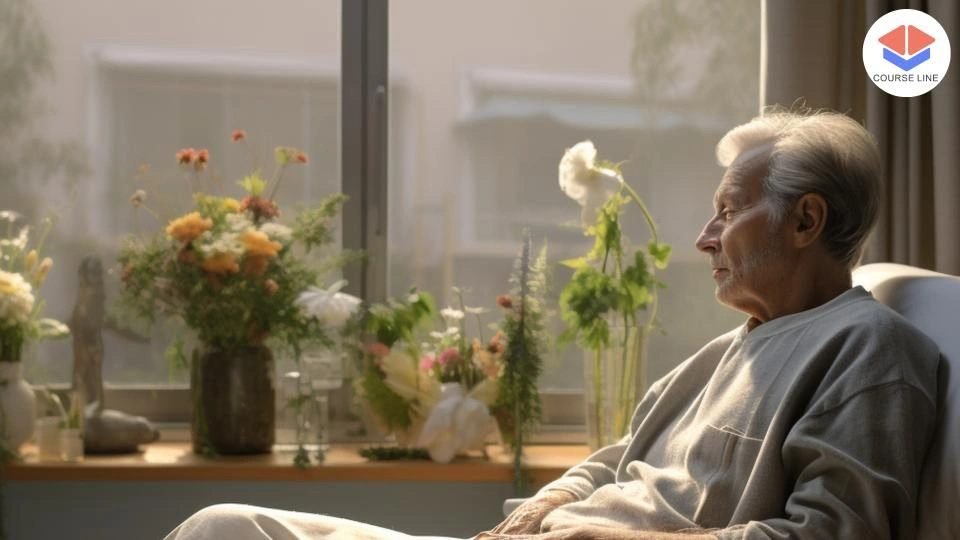Course Features
Price
Study Method
Online | Self-paced
Course Format
Reading Material - PDF, article
Duration
7 hours, 45 minutes
Qualification
No formal qualification
Certificate
At completion
Additional info
Coming soon
- Share
Overview
The Palliative Care Level 8 Advanced Diploma is a high-level training programme that equips healthcare professionals with the specialised knowledge and skills required to deliver compassionate, patient-centred care to individuals facing life-limiting illnesses. This course delves into the principles and philosophy of palliative care, highlighting its holistic approach in addressing the physical, emotional, social, and spiritual dimensions of suffering. Learners explore the evolution of palliative care within the UK, with a focus on providing culturally sensitive and ethically sound care across diverse populations.
Students will gain expertise in advanced pain and symptom management, including pharmacological and non-pharmacological methods to alleviate distressing conditions such as dyspnoea, nausea, and delirium. In-depth modules address the psychological and spiritual challenges faced by patients and families, as well as effective communication techniques for breaking bad news and supporting end-of-life conversations. Emphasis is placed on shared decision-making, advance care planning, and building empathy through listening and understanding.
The course also covers legal and ethical considerations, multidisciplinary team collaboration, and palliative care delivery across various settings including hospitals, hospices, care homes, and the community. Special populations, such as children, older adults, and individuals with learning disabilities, are given dedicated focus to ensure inclusive, equitable care. Learners will explore how to support bereaved families through structured aftercare, and gain leadership insight into managing palliative services. The programme concludes with an emphasis on evidence-based research, reflective practice, and innovations shaping the future of palliative care.
Who is this course for?
The Palliative Care Level 8 Advanced Diploma is a high-level training programme that equips healthcare professionals with the specialised knowledge and skills required to deliver compassionate, patient-centred care to individuals facing life-limiting illnesses. This course delves into the principles and philosophy of palliative care, highlighting its holistic approach in addressing the physical, emotional, social, and spiritual dimensions of suffering. Learners explore the evolution of palliative care within the UK, with a focus on providing culturally sensitive and ethically sound care across diverse populations.
Students will gain expertise in advanced pain and symptom management, including pharmacological and non-pharmacological methods to alleviate distressing conditions such as dyspnoea, nausea, and delirium. In-depth modules address the psychological and spiritual challenges faced by patients and families, as well as effective communication techniques for breaking bad news and supporting end-of-life conversations. Emphasis is placed on shared decision-making, advance care planning, and building empathy through listening and understanding.
The course also covers legal and ethical considerations, multidisciplinary team collaboration, and palliative care delivery across various settings including hospitals, hospices, care homes, and the community. Special populations, such as children, older adults, and individuals with learning disabilities, are given dedicated focus to ensure inclusive, equitable care. Learners will explore how to support bereaved families through structured aftercare, and gain leadership insight into managing palliative services. The programme concludes with an emphasis on evidence-based research, reflective practice, and innovations shaping the future of palliative care.
Requirements
The Palliative Care Level 8 Advanced Diploma is a high-level training programme that equips healthcare professionals with the specialised knowledge and skills required to deliver compassionate, patient-centred care to individuals facing life-limiting illnesses. This course delves into the principles and philosophy of palliative care, highlighting its holistic approach in addressing the physical, emotional, social, and spiritual dimensions of suffering. Learners explore the evolution of palliative care within the UK, with a focus on providing culturally sensitive and ethically sound care across diverse populations.
Students will gain expertise in advanced pain and symptom management, including pharmacological and non-pharmacological methods to alleviate distressing conditions such as dyspnoea, nausea, and delirium. In-depth modules address the psychological and spiritual challenges faced by patients and families, as well as effective communication techniques for breaking bad news and supporting end-of-life conversations. Emphasis is placed on shared decision-making, advance care planning, and building empathy through listening and understanding.
The course also covers legal and ethical considerations, multidisciplinary team collaboration, and palliative care delivery across various settings including hospitals, hospices, care homes, and the community. Special populations, such as children, older adults, and individuals with learning disabilities, are given dedicated focus to ensure inclusive, equitable care. Learners will explore how to support bereaved families through structured aftercare, and gain leadership insight into managing palliative services. The programme concludes with an emphasis on evidence-based research, reflective practice, and innovations shaping the future of palliative care.
Career path
The Palliative Care Level 8 Advanced Diploma is a high-level training programme that equips healthcare professionals with the specialised knowledge and skills required to deliver compassionate, patient-centred care to individuals facing life-limiting illnesses. This course delves into the principles and philosophy of palliative care, highlighting its holistic approach in addressing the physical, emotional, social, and spiritual dimensions of suffering. Learners explore the evolution of palliative care within the UK, with a focus on providing culturally sensitive and ethically sound care across diverse populations.
Students will gain expertise in advanced pain and symptom management, including pharmacological and non-pharmacological methods to alleviate distressing conditions such as dyspnoea, nausea, and delirium. In-depth modules address the psychological and spiritual challenges faced by patients and families, as well as effective communication techniques for breaking bad news and supporting end-of-life conversations. Emphasis is placed on shared decision-making, advance care planning, and building empathy through listening and understanding.
The course also covers legal and ethical considerations, multidisciplinary team collaboration, and palliative care delivery across various settings including hospitals, hospices, care homes, and the community. Special populations, such as children, older adults, and individuals with learning disabilities, are given dedicated focus to ensure inclusive, equitable care. Learners will explore how to support bereaved families through structured aftercare, and gain leadership insight into managing palliative services. The programme concludes with an emphasis on evidence-based research, reflective practice, and innovations shaping the future of palliative care.
-
- Definition, Philosophy and Goals of Palliative Care 00:10:00
- Evolution of Palliative Care in the UK 00:10:00
- Differences Between Palliative, Hospice, and End-of-Life Care 00:10:00
- Patient-Centred Approach and Holistic Care 00:10:00
-
- Pain Physiology and Assessment in Terminal Illness 00:10:00
- Pharmacological Management (Opioids, NSAIDs, Adjuvants) 00:10:00
- Non-Pharmacological Pain Relief Strategies 00:10:00
- Managing Complex Symptoms (Dyspnoea, Nausea, Delirium, etc.) 00:10:00
- Psychological Support for Patients and Families 00:10:00
- Addressing Grief, Depression, and Anxiety 00:10:00
- Spiritual Assessment and Support 00:10:00
- Cultural Competency in End-of-Life Care 00:10:00
- Ethics in Palliative Care: Autonomy, Justice, and Beneficence 00:10:00
- Legal Framework in the UK (Mental Capacity Act, DNACPR, etc.) 00:10:00
- Consent, Confidentiality, and Documentation 00:10:00
- Ethical Dilemmas: Assisted Dying and Withdrawal of Treatment 00:10:00
- Palliative Care in Hospitals 00:10:00
- Home-Based and Community Palliative Services 00:10:00
- Care in Hospices and Nursing Homes 00:10:00
- Integrating Palliative Care in Emergency and Intensive Care 00:10:00
- Grief Theories and Stages of Mourning 00:10:00
- Providing Support to Families and Children 00:10:00
- Bereavement Risk Assessment 00:10:00
- Designing and Delivering Aftercare Services 00:10:00
- Exam of Palliative Care Level 8 Advanced Diploma 00:50:00

No Reviews found for this course.
Is this certificate recognized?
Yes, our premium certificate and transcript are widely recognized and accepted by embassies worldwide, particularly by the UK embassy. This adds credibility to your qualification and enhances its value for professional and academic purposes.
I am a beginner. Is this course suitable for me?
Yes, this course is designed for learners of all levels, including beginners. The content is structured to provide step-by-step guidance, ensuring that even those with no prior experience can follow along and gain valuable knowledge.
I am a professional. Is this course suitable for me?
Yes, professionals will also benefit from this course. It covers advanced concepts, practical applications, and industry insights that can help enhance existing skills and knowledge. Whether you are looking to refine your expertise or expand your qualifications, this course provides valuable learning.
Does this course have an expiry date?
No, you have lifetime access to the course. Once enrolled, you can revisit the materials at any time as long as the course remains available. Additionally, we regularly update our content to ensure it stays relevant and up to date.
How do I claim my free certificate?
I trust you’re in good health. Your free certificate can be located in the Achievement section. The option to purchase a CPD certificate is available but entirely optional, and you may choose to skip it. Please be aware that it’s crucial to click the “Complete” button to ensure the certificate is generated, as this process is entirely automated.
Does this course have assessments and assignments?
Yes, the course includes both assessments and assignments. Your final marks will be determined by a combination of 20% from assignments and 80% from assessments. These evaluations are designed to test your understanding and ensure you have grasped the key concepts effectively.
Is this course accredited?
We are a recognized course provider with CPD, UKRLP, and AOHT membership. The logos of these accreditation bodies will be featured on your premium certificate and transcript, ensuring credibility and professional recognition.
Will I receive a certificate upon completion?
Yes, you will receive a free digital certificate automatically once you complete the course. If you would like a premium CPD-accredited certificate, either in digital or physical format, you can upgrade for a small fee.
Course Features
Price
Study Method
Online | Self-paced
Course Format
Reading Material - PDF, article
Duration
7 hours, 45 minutes
Qualification
No formal qualification
Certificate
At completion
Additional info
Coming soon
- Share
Patisserie Level 3 Advanced Diploma
Course Line240£490.00Original price was: £490.00.£14.99Current price is: £14.99.Wellness Coach Certification: Stress, Emotional Balance & Sleep Mastery
Kazi Shofi Uddin Bablu237£490.00Original price was: £490.00.£14.99Current price is: £14.99.Financial Statement Analysis – Mastering the Art of Reading Reports
Course Line237£490.00Original price was: £490.00.£14.99Current price is: £14.99.





